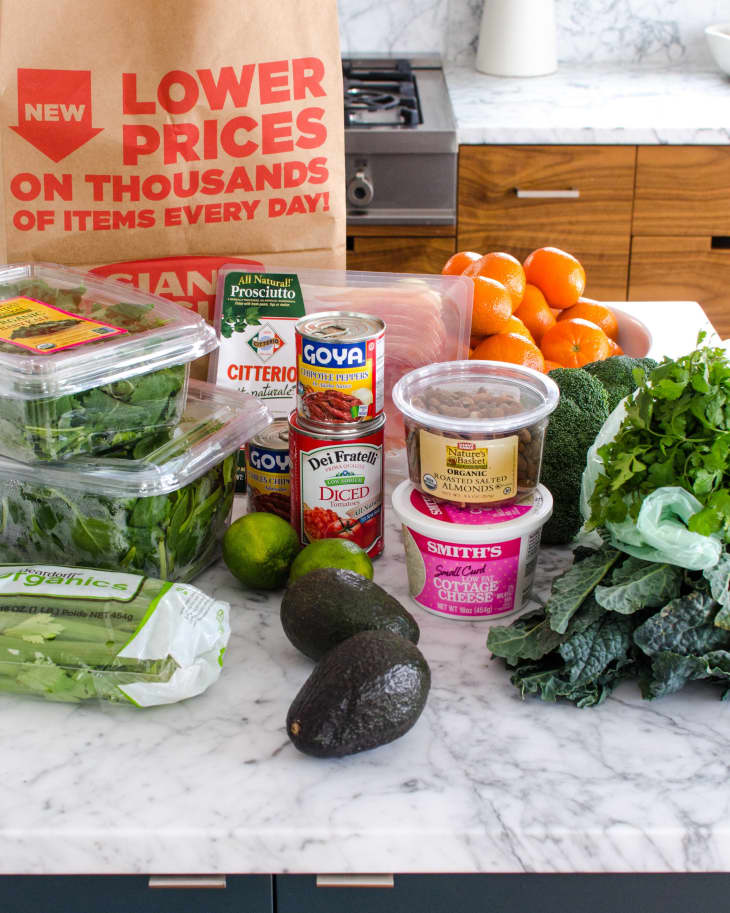Ask Yourself These 5 Questions Before You Start Meal Planning
I’ve been meal planning regularly since my first kid was born more than five years ago, and I can say without question that these are the five most helpful questions to get you started on deciding what to make for dinner each week. You don’t need to figure out a Google spreadsheet or browse Kitchn’s recipe page for recipes before you start practicing these five questions every week (or every two weeks if that works best for you). Their goal is to help you figure out what really matters before you even begin to think about a recipe.
Here’s how I do it: On Friday evenings, after pizza dinner is cleaned up and the kids are in bed, I make myself a cocktail and pull out my paper planner to create a meal plan for the week ahead. And every week before I start searching for recipes, I go over these five questions with my calendar.
1. How many meals do I need to plan for?
In part this will be dictated by your meal planning prowess. Newbie meal planners should focus on just planning dinner meals for a week, while seasoned meal planners might include breakfast or lunches or all three. Use five dinner meals as a jumping-off point, but then look at your social calendar (and take stock of your known habits) and subtract meals accordingly. For example, we always have pizza on Friday nights so I don’t plan a dinner meal for that calendar day. Maybe you have a book club on Monday and you’ll enjoy wine and cheese with friends in lieu of a dinner meal.
A meal planning must read: 5 Things I Wish Someone Had Told Me 5 Years Ago About Meal Planning
2. What type of meals do I need?
Keeping an eye on your weekly calendar, assess what evening challenges and opportunities you have this week and define what types of meals you need. Tuesday my daughter has art class and we go straight from school pick-up to art class and then home for dinner. Dinner has to be waiting for us when we get home so I look for slow cooker meals for Tuesday night dinners. Maybe you’ve got your vegan-ish friends stopping by on Wednesday or you need something quick between work and volunteering on Thursdays.
Creating a meal template is also a clever way to narrow your search for recipes. If you love tacos, plan a taco night every week and know that you’ll find new, well-loved, and exciting recipes with ease to satisfy your taco dragon.
3. What time constraints do you need to account for?
While this might seem similar to “What type of meals do I need?” these time constraints aren’t the ones you face in the evening — these are the timing issues that will come up throughout the day. You can’t have a slow cooker meal on Tuesday that only requires six hours of cooking if you won’t be home at lunch to put it together. You shouldn’t plan to thaw that pot roast on Friday if you have yoga class first thing in the morning. Identify not only what type of recipes you’ll need but also what your limits are before you start selecting recipes. This makes it easier to weed through your inspiration.
4. How will I remember my meal plan?
One of the key hallmarks of successful meal planning is a clear mind. You can’t clear your mind if your recipes aren’t written somewhere for reference. For a long time I just used a sheet of scrap paper and tacked it to the front of the fridge for reference. It can actually be that stunningly simple. A white board hung in the kitchen is another timeless option. Finally, just note the meals you need in your planner or calendar. I use a two-point method — my planner (for quick reference on the go and at the grocery store) and I post my plan on a white board on our fridge, so my husband can have quick reference on how to help prep dinner.
Two Smart Strategies for Saving Your Meal Plan
- How I Use Google Sheets for Meal Planning
For Easier Meal Planning, Keep a Dinner Diary
5. What is my favorite Plan B, go-to, back pocket recipe?
Even the best meal planners face unexpected bad moods, missed trains, and meetings that go long. You have to plan for the unexpected as much as possible. This might mean writing your Plan B on your list and shopping for it, or it might be as simple as making sure you always have eggs on hand for a quick omelet.
My tried-and-true rule every newbie needs to know: The Golden Rule of Meal Planning
Tell me what challenges do you face at dinner time, and how do you plan for them?
Wait, What Exactly Is Meal Planning?
You’ve heard the good news — meal planning is going to improve your life by saving you time and money while lowering your stress, but you aren’t sure exactly what meal planning is or where to start with meal planning. We are here to help. Meal planning is asking the question, “What’s for dinner?” once for the whole week, instead of every night, and then shopping and preparing for those dinners. The process is just three steps: select your dinners (and their recipes, if needed), shop for ingredients, and finally turn those ingredients into a meal.
Our 3-Step Process for Meal Planning
The Best Way to Use a Weekend for Meal Planning Success
